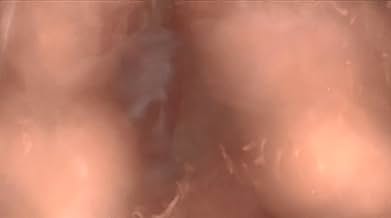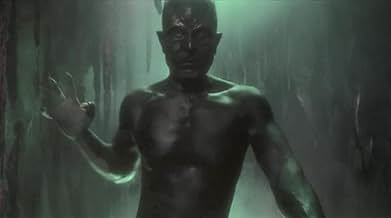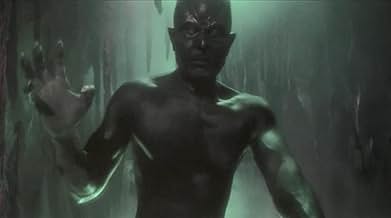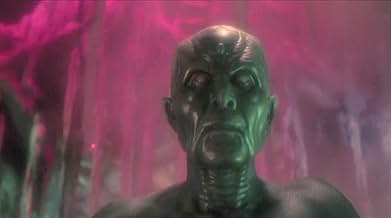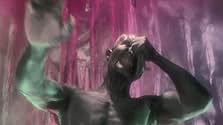Agrega una trama en tu idiomaTwo magically powerful monks are sent on a quest to fight the King of Hell.Two magically powerful monks are sent on a quest to fight the King of Hell.Two magically powerful monks are sent on a quest to fight the King of Hell.
- Dirección
- Guionistas
- Elenco
Siu-Fung Wong
- Raga
- (as Siu-fung Wong)
Siu Tak-Foo
- Kubira's Soldier
- (as Foo Siu)
Opiniones destacadas
Peacock King is about two monks who are on a quest to stop some demon from entering the earth realm, I think. Eh! The story was relatively comprehensible but I was still somewhat perplexed for some unknown reason. Nam Nai Choi is one of my favorite directors ever because of his other films Story Of Ricky, 7th Curse and The Cat so I am going to be lenient with this one. Why i like this one is because of the cinematography in which is Choi's greatest strengths considering he was a cinematographer for Shaw Brothers, the special effects were actually cool as ****, the monsters were creative and the action was fun. And Gloria Yip, too, which I have a desire to put my nuts in her adorable face and butt! The pacing was sluggish but I don't care. Not his best movie but it is wacky fun.
This is a rather fun little action fantasy film from Hong Kong and Japan, about two monk brothers, Kôngquè (Biao Yuen) and Kujaku (Hiroshi Mikami), separated at birth and later reunited to fight the King of Hell.
The pacing is not really fast, but there are some engaging and entertaining scenes where Kongque and Kujaku try to blend in the modern days in Hong Kong and fight off the evil witch Raga (Siu-Fung Wong) and save their friend, Ashura (Gloria Yip). Ashura is unwittingly the apprentice of Raga and is the daughter of the King of Hell.
There are plenty of mythical elements and magical action, though the special effects were pretty average to me. A nice good vs. evil story line nonetheless, and some decent martial arts action.
Grade B-
The pacing is not really fast, but there are some engaging and entertaining scenes where Kongque and Kujaku try to blend in the modern days in Hong Kong and fight off the evil witch Raga (Siu-Fung Wong) and save their friend, Ashura (Gloria Yip). Ashura is unwittingly the apprentice of Raga and is the daughter of the King of Hell.
There are plenty of mythical elements and magical action, though the special effects were pretty average to me. A nice good vs. evil story line nonetheless, and some decent martial arts action.
Grade B-
Hong Kong adaptations of Japanese manga tend to hit differently, The Peacock King is no exception, always moving at a frantic pace. There's plenty of ambition sprinkled throughout the film, be it the incredible set design, insane practical effects or the stunning claymation work, the film certainly earns its keep. The problem that ultimately holds this film back from being an all-time classic of its industry is that unfortunately, the story is so unbelievably messy with the most minor of things derailing the experience, having six credited writers certainly gives you that impression. Regardless of that, director Lam Ngai Kai more than delivers plenty of his signature style even including a sequence where Yuen Biao battles a reanimated dinosaur, yes that happens, it just all feels a bit more on the cheaper side with its budget having been spent on its effects more than anything else. Backed by a great cast, including a sadly underused Gordon Liu, and a decent musical score, The Peacock King manages to keep an enjoyable tone despite the cheapness of the proceedings. I'll get to the sequel at some point.
This was amongst the reasons why growing up in the 80s was cool, with Hong Kong cinema at its heydays and with just about every genre that's covered. And for a kid growing up during the era, Peacock King, in my memory, was one hell of a special effects extravaganza and showing off, at the time, what the East could do with special effects that the West have already accomplished, with fantasy monsters coming to life with stop motion rubber suits and the likes, similar to films such as Ghostbusters or Clash of the Titans, which if viewed today looks dated, but still contains a lot of charm.
Alas, The Peacock King somehow didn't withstand the test of time. A kid would have found the premise very interesting, dealing with hell's gates and a hell virgin who held the key to the destruction of mankind once she heralds the return of the hell king, and it is up to two monks to stop every conceivable devil in his or her tracks. Conveniently, given that this is a Hong Kong-Japan co-production, the location of the hell's gates happen to be in Tokyo, Hong Kong, and in Tibet, where the monks Peacock (Yuen Biao) and Lucky Fruit (Migami Hiroshi) meet by chance when they're sent by their masters Ku Fong (Eddy Ko) and Ji Ku (Ken Ogata) respectively, to stop hell virgin Ashura (Gloria Yip in her debut) chaperoned by the evil witch Raga (Pauline Wong Siu Fung) to fulfill the former's destiny.
However the storyline if viewed today, as an adult, consists of plenty of unnecessary sub plots and loopholes, and characters who don't really serve a purpose. For instance, there's the retail store's Okada (Yasuda Narumi) who's in this film just to balance the female quotient, being more than a bother since she hangs around the monks and in my opinion seems more like a liability with her non-powers as well as potential to trip things up. Moreover, her character also presents an unlikely romance with Lucky Fruit, so there isn't really a point to get her over to Hong Kong or Tibet once the Tokyo story arc is over.
Then there's the waste of Gordon Liu's character Kubira, a warrior sent on an assassination attempt on our heroes, if only to allow for a backstory to tell of how the two lead characters are linked together in a twist of fate, and to provide for more credible fight sequences using bona fide kung fu, balancing out the over-reliance of special effects here. But Kubira's introduction gives additional time to Ken Ogata as the latter comes to the aid of his disciple during the final act, in addition to brining a lot more unnamed characters into the fray for that increase in body count.
Director Lam Ngai Kai may be questioned for his choice of inserting random English language music to make this truly a one of a kind international production, but really the soundtrack stuck out like a sore thumb. Some filler scenes could also be done without, since they pose a lot more unnecessary questions - an airplane shot means the heroes travel by air, but how would they pass customs with their weapons, and the bringing of a Hell Virgin as a passenger? Hmm. But I suppose such is the charm when watching it as a kid as you rarely question these points and take things at face value, in it for the many special effects shots that pepper the movie.
And in all honesty, for that time, they were well done, with grotesque looking monsters given some air time to up the eerie quotient. Some are done for the sake of, such as Peacock's exorcising of a few critters on the streets of Tokyo, while others look really rubberized, such as the dinosaurs in the shopping centre arcade. Raga's transformation was perhaps the highlight, showing off the creativity of the filmmakers in making something really functionally ugly, while the design of the Hell King was kept quite simple - that of a giant, bald man.
One would have expected the role of Peacock to provide a lot more visibility to Yuen Biao, but sadly this wasn't really the case. He shares screen time with Lucky Fruit's Migami Hiroshi to contrast the opposites of both men - one the relaxed joker while the other a little bit more uptight, to have to learn to cooperate with each other given an adversarial introduction, in order to combine their strengths to save mankind. Gloria Yip as the Hell Virgin also didn't have much to do here, other than to act cute when away from Raga and happen to be frolicking the Ocean Park theme park with Peacock, for him to be convinced that she's nothing but an innocent child who's ruined by Fate to do the inevitable. There's not much of a character development in any character here other than the perfunctory scenes, given that much of the 80 minutes got dedicated to battles, mostly CG enhanced rather than to showcase real moves, which is a pity.
Revisiting Peacock King somehow marred that wonderful film that I had in my mind no doubt created by being awed as a kid. Watching it today made me realize it's quite a weak film with only dated special effects to boast about. and I wonder since some older classics have been remade by Hong Kong filmmakers, whether anyone had thought about this manga inspired movie to be given an update as well. One can only hope.
Alas, The Peacock King somehow didn't withstand the test of time. A kid would have found the premise very interesting, dealing with hell's gates and a hell virgin who held the key to the destruction of mankind once she heralds the return of the hell king, and it is up to two monks to stop every conceivable devil in his or her tracks. Conveniently, given that this is a Hong Kong-Japan co-production, the location of the hell's gates happen to be in Tokyo, Hong Kong, and in Tibet, where the monks Peacock (Yuen Biao) and Lucky Fruit (Migami Hiroshi) meet by chance when they're sent by their masters Ku Fong (Eddy Ko) and Ji Ku (Ken Ogata) respectively, to stop hell virgin Ashura (Gloria Yip in her debut) chaperoned by the evil witch Raga (Pauline Wong Siu Fung) to fulfill the former's destiny.
However the storyline if viewed today, as an adult, consists of plenty of unnecessary sub plots and loopholes, and characters who don't really serve a purpose. For instance, there's the retail store's Okada (Yasuda Narumi) who's in this film just to balance the female quotient, being more than a bother since she hangs around the monks and in my opinion seems more like a liability with her non-powers as well as potential to trip things up. Moreover, her character also presents an unlikely romance with Lucky Fruit, so there isn't really a point to get her over to Hong Kong or Tibet once the Tokyo story arc is over.
Then there's the waste of Gordon Liu's character Kubira, a warrior sent on an assassination attempt on our heroes, if only to allow for a backstory to tell of how the two lead characters are linked together in a twist of fate, and to provide for more credible fight sequences using bona fide kung fu, balancing out the over-reliance of special effects here. But Kubira's introduction gives additional time to Ken Ogata as the latter comes to the aid of his disciple during the final act, in addition to brining a lot more unnamed characters into the fray for that increase in body count.
Director Lam Ngai Kai may be questioned for his choice of inserting random English language music to make this truly a one of a kind international production, but really the soundtrack stuck out like a sore thumb. Some filler scenes could also be done without, since they pose a lot more unnecessary questions - an airplane shot means the heroes travel by air, but how would they pass customs with their weapons, and the bringing of a Hell Virgin as a passenger? Hmm. But I suppose such is the charm when watching it as a kid as you rarely question these points and take things at face value, in it for the many special effects shots that pepper the movie.
And in all honesty, for that time, they were well done, with grotesque looking monsters given some air time to up the eerie quotient. Some are done for the sake of, such as Peacock's exorcising of a few critters on the streets of Tokyo, while others look really rubberized, such as the dinosaurs in the shopping centre arcade. Raga's transformation was perhaps the highlight, showing off the creativity of the filmmakers in making something really functionally ugly, while the design of the Hell King was kept quite simple - that of a giant, bald man.
One would have expected the role of Peacock to provide a lot more visibility to Yuen Biao, but sadly this wasn't really the case. He shares screen time with Lucky Fruit's Migami Hiroshi to contrast the opposites of both men - one the relaxed joker while the other a little bit more uptight, to have to learn to cooperate with each other given an adversarial introduction, in order to combine their strengths to save mankind. Gloria Yip as the Hell Virgin also didn't have much to do here, other than to act cute when away from Raga and happen to be frolicking the Ocean Park theme park with Peacock, for him to be convinced that she's nothing but an innocent child who's ruined by Fate to do the inevitable. There's not much of a character development in any character here other than the perfunctory scenes, given that much of the 80 minutes got dedicated to battles, mostly CG enhanced rather than to showcase real moves, which is a pity.
Revisiting Peacock King somehow marred that wonderful film that I had in my mind no doubt created by being awed as a kid. Watching it today made me realize it's quite a weak film with only dated special effects to boast about. and I wonder since some older classics have been remade by Hong Kong filmmakers, whether anyone had thought about this manga inspired movie to be given an update as well. One can only hope.
This was one movie where acting of Hong Kong actors and Japanese actors interaction went extremely smooth. Usually in HK movie made in Japan have HK actor doing lion share of the dialog, and Japanese actors are relegated to small roles where they speak only few simple Japanese words. Not this movie. It's amazing that the actors just went playing their role as if it was done in their native language, and somehow it all looked natural.
When you look at this movie its really difficult to tell who's the Japanese actor and who's from Hong Kong. Genetically, all Asians must be pretty close to one another.
In Cantonese version Yuen Bao is the main character, but in the Japanese version Hiroshi Mikami is the main character. They wrote the script very cleverly that the two characters are interchangeable.
Based on a comic by Makoto Ogino, Peacock King, or Kujyaku Oo is a good translation of the original comic into a movie. The original comic's ordinary person, or situation suddenly morphing into a demonic entity is also translated well into this movie.
I liked Narumi Yasuda's acting as a department worker suddenly finding herself embroiled in the world of Vajirayana Buddhism vs demons of the underworld.
World looked really peaceful and healthy in Japan around the time this movie was made. It truly was the best of times.
Really well made movie of its kind. It's a treat to watch.
When you look at this movie its really difficult to tell who's the Japanese actor and who's from Hong Kong. Genetically, all Asians must be pretty close to one another.
In Cantonese version Yuen Bao is the main character, but in the Japanese version Hiroshi Mikami is the main character. They wrote the script very cleverly that the two characters are interchangeable.
Based on a comic by Makoto Ogino, Peacock King, or Kujyaku Oo is a good translation of the original comic into a movie. The original comic's ordinary person, or situation suddenly morphing into a demonic entity is also translated well into this movie.
I liked Narumi Yasuda's acting as a department worker suddenly finding herself embroiled in the world of Vajirayana Buddhism vs demons of the underworld.
World looked really peaceful and healthy in Japan around the time this movie was made. It truly was the best of times.
Really well made movie of its kind. It's a treat to watch.
¿Sabías que…?
- Versiones alternativasThe film's Japanese theatrical release (also seen on VHS and laserdisc) features over 12 minutes of additional and extended scenes missing from the Hong Kong cut, primarily focused on Hiroshi Mikami's Kujaku and Narumi Yasuda's Saeko Kazama. Some of these scenes would even be filmed with sync sound Japanese, unlike the standard-at-the-time "dubbed from start to finish" Cantonese of the HK cut.
- ConexionesFollowed by A Xiu Luo (1989)
Selecciones populares
Inicia sesión para calificar y agrega a la lista de videos para obtener recomendaciones personalizadas
- How long is Peacock King?Con tecnología de Alexa
Detalles
Contribuir a esta página
Sugiere una edición o agrega el contenido que falta

Principales brechas de datos
By what name was Hung cheuk wong ji (1988) officially released in Canada in English?
Responda

